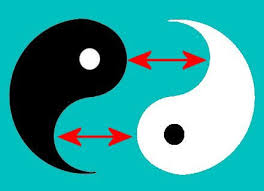
Aggression is a universal phenomenon within the human species. Both genders and all races are capable of it. Not only are we capable of aggression when it comes to sex, property and dominance but we are also capable of it when it comes to politics. This essay looks at the masculine and feminine expressions of political aggression.
The nature of the masculine is to discriminate. This is represented metaphysically by the straight line, the angle and the number one, and is represented biologically by the sperm. A straight line is, after all, the shape of a sword, and the purpose of a sword is to separate and keep apart those things that the wielder believes should be separated and kept apart.
The nature of the feminine is to bring together. This is represented metaphysically by the circle, the curve and the number zero, and is represented biologically by the egg. The circle is the optimal way to achieve the largest possible surface area for the smallest possible perimeter, and is therefore the most inclusive shape that can be drawn.
The characteristic masculine political sensibility is disgust when confronted with disorder. This means that the masculine is that which desires to keep the peace and to keep things under control. This is partially achieved by means of the sword – to be more precise, the masculine keeps order by inspiring fear with its use of violence.
The ultimate feminine emotion is fear, and so the masculine right wing fights an eternal “War on Terror.” This it carries out by attacking places of excessive chaos. And so, it can be observed in the modern West that masculine aggression finds a political expression in conservatism, which seeks to impose order on as much of the world as possible.
The Republican Administration of George W. Bush is an excellent example of this. Under George W. Bush the masculine sentiments of Americans found a home in the War on Terror – which is essentially a war on the excess of feminine emotion. This led them to attack the Middle East in the belief that it was a chaotic place that produced terrorists, and which therefore needed order imposed upon it.
The characteristic feminine political sensibility is horror when confronted with oppression (this probably developed as a consequence of being confronted with the possibility of rape). This means that the feminine seeks to include as much as it can (in other words, to discriminate as little as possible).
This can be observed by looking at the nature of a circle, which is the appropriate shape for including as many people as possible on even terms. Inclusiveness, and a belief in the value of inclusiveness, was probably how prehistoric matriarchal societies prevented any frustrated reproductive instincts among its malefolk from spilling over into jealous violence.
The ultimate masculine emotion is hate, and so the feminine left wing fights an eternal “War on Hate.” This it carries out by attacking places of excessive order. And so, it can be observed in our societies that feminine aggression finds a political expression in liberalism.
There are any number of examples of this, perhaps the best one being the neo-Communist street gang Antifa, who are known for indiscriminate violence in the name of fighting discrimination.
Feminine political aggression is usually expressed as a will to tear down all borders, walls and hierarchies that separate people. Feminine political aggression thus occurs when the masses get together to get rid of a monarchy, for example, or through voting Marxist policies into law in democratic elections.
In many ways, these two sentiments work together. Most Westerners consider slavery, for example, to be both disorderly and oppressive, and consequently the vast majority of Westerners abhor the practice and it is illegal in all Western countries. Likewise, public health epidemics create both disorder in making people sick and oppression in making people suffer from the disease, and so society is capable of working together harmoniously to fight such things.
In other ways these sentiments work directly against each other. The most obvious example of this is immigration, especially immigration from refugees. The masculine sentiments are generally against refugees turning up because of a belief that they create disorder and disharmony, and many masculine thinkers are duly disgusted by politicians who argue in favour of this.
The feminine sentiments, on the other hand, are generally in favour of refugees because they do not want to exclude them from the perceived benefits of society. To exclude, after all, is to discriminate, and that is a masculine political expression.
Another common example is that of the drug war. Because using drugs causes original thoughts and original behaviours to arise, the natural masculine reaction is to punish their use in the belief that they cause chaos. The natural feminine reaction, on the other hand, is to reject punishment for taking drugs in the belief that this is oppression.
These two differing forms of aggression share what is common to all aggression, namely a will to remake the world in the image of the aggressor. They only differ in terms of what is targeted for destruction – chaos in the case of masculine aggression, and order in the case of feminine aggression.



